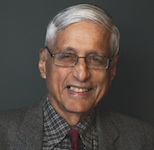What Gandhi really told the RSS chief
In his article (‘The Mahatma and the Sangh’, IE, April 12), Manmohan Vaidya, the RSS joint general secretary, recalls an interesting meeting that took place in Delhi in 1947 between Mahatma Gandhi and M S Golwalkar, the RSS chief at that time. Citing Golwalkar’s ‘Complete Works’, Vaidya quotes remarks about the meeting that Golwalkar evidently made 22 years later, in 1969.
Vaidya writes: ‘On the occasion of the birth centenary of Mahatma Gandhi, a statue of Gandhiji was unveiled by Golwalkar. In his address, he said: “My last meeting with Mahatma ji was in 1947. At that time riots broke in Delhi. Even those who were non-violent by tradition had become cruel, rogue and heartless. Mahatma Ji said to me: ‘See, what is happening?’ I said: ‘This is our misfortune. British used to say when we leave; you people will slit each other’s throats. Today, the same thing is happening. It is bringing disrepute to us in the whole world.’ In the prayer meeting of that day, Gandhijii took my name with pride and expressed my thoughts.”
While researching for my Patel biography (first published in 1990) and my Gandhi biography (which came out in 2006), I too had come across the Gandhi-Golwalkar meeting of September 12, 1947. Apart from Gandhi’s journal, Harijan, which published his prayer-meeting remarks, and the Collected Works of Mahatma Gandhi, I found references to the meeting in two other places: In Brij Krishna Chandiwala’s Gandhiji ki Dilli Diaryand in a letter that Nehru wrote to Patel in October 1948, found in Sardar Patel’s Correspondence (ed. Durga Das), vol. 7, p. 672.
Harijanof September 21, 1947, gives Gandhi’s account, delivered on September 12 at the end of his prayer-meeting, of his talk with Golwalkar earlier that day: ‘He had been told (Gandhi said to Golwalkar) that the hands of [RSS] were steeped in blood. The Guruji assured him that this was untrue. That organisation did not stand for the killing of Muslims. All it wanted to do was to protect Hindustan to the best of its ability. It stood for peace and he had asked Gandhiji to make his views public.’
In Delhi in 1947, Brij Krishna Chandiwala was Gandhi’s constant companion. He had become Gandhi’s aide and associate from 1920, when he left St Stephen’s College to join the Non-cooperation Movement.
According to Brij Krishna, when Golwalkar assured him that the RSS did not stand for the killing of Muslims, Gandhi asked him to say so publicly. Golwalkar said Gandhi could quote him. This Gandhi did in his prayer talk that evening, but he told Golwalkar that the statement ought to come from him. Afterwards, according to a letter that Nehru wrote to Patel on October 27, 1948, Gandhi told Nehru that he did not find Golwalkar convincing.
Connected to the Gandhi-Golwalkar encounter was Gandhi’s conversation four days later (September 16, 1947) with RSS workers in New Delhi’s Balmiki Colony, which figures in Harijan, in Mahatma Gandhi: The Last Phase, written by his aide and secretary from 1919, Pyarelal Nayyar, and in Brij Krishna’s diary.
Gandhi told the RSS workers that while he had been impressed years earlier by the discipline, simplicity and absence of untouchability he had noticed in an RSS camp, ‘sacrifice without purity of motive and true knowledge has been known to prove ruinous to society’. Their ‘strength could be used in the interest of India or against it’.
When an RSS worker asked Gandhi if Hinduism did not permit killing an evildoer, he answered: ‘How could a sinner claim the right to judge or execute another sinner?’ Only a properly constituted government was entitled to punish an evildoer. Speaking of Patel and Nehru, Gandhi said: ‘[The two] have been colleagues for years and have the same aim,’ and added: ‘Both the Sardar and Pandit Nehru will be rendered powerless if you become judge and executioner in one. Do not sabotage their efforts by taking the law into your own hands.’
Then Gandhi said something which may be relevant today in India and, with necessary substitutions, elsewhere: ‘If the vast bulk of the Hindus wanted to go in a particular direction, even though it might be wrong, no one could prevent them from doing so. But even a single individual had the right to raise his voice against it, and give them the warning. That is what I have been doing.’
__
From theIndian Express, April 17, 2019.
https://indianexpress.com/article/opinion/columns/what-mahatama-gandhi-…
